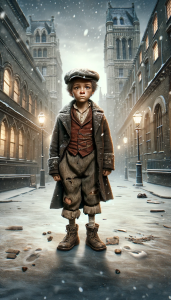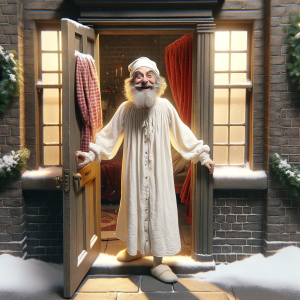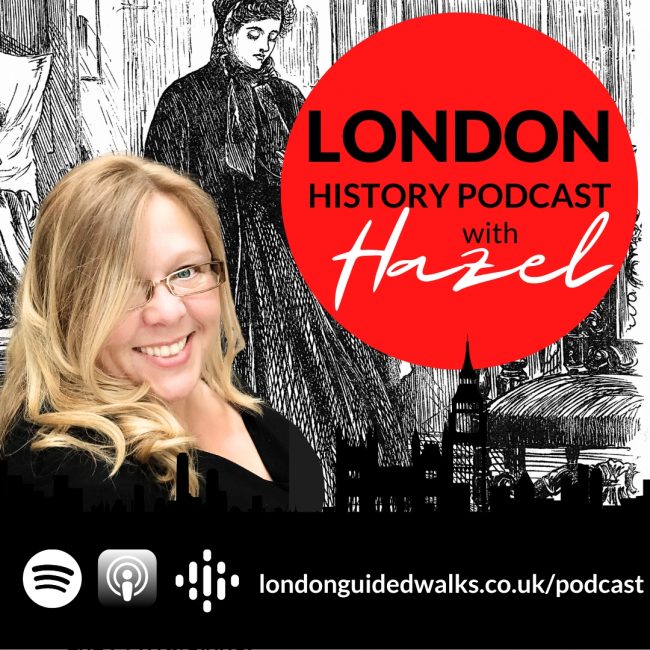This episode promises to be a blend of historical fact, literary exploration, and vivid storytelling, providing a unique lens through which to view one of the world’s most famous cities. So whether you’re a history buff, a Dickens enthusiast, or just love a good story, join us as we traverse the cobbled streets and foggy alleyways of Dickens’ London through the eyes of Archie.

London Guided Walks » Episode 127: Archie’s Journey Through Dickens’ London
Episode 127: Archie’s Journey Through Dickens’ London

Host: Hazel Baker
Hazel is an active Londoner, a keen theatre-goer and qualified CIGA London tour guide.
She has won awards for tour guiding and is proud to be involved with some great organisations. She is a freeman of the Worshipful Company of Marketors and am an honorary member of The Leaders Council.
Channel 5’s Walking Wartime Britain(Episode 3) and Yesterday Channel’s The Architecture the Railways Built (Series 3, Episode 7). Het Rampjaar 1672, Afl. 2: Vijand Engeland and Arte.fr Invitation au Voyage, À Chelsea, une femme qui trompe énormément.
Christmas-Related Podcast Episodes
Episode 99. Royal Christmas Speech – a modern tradition
Episode 98. Christmas Puddings Through History
Episode 75: The Christmas Cracker – A Victorian Invention
Episode 74: Christmas in Post War London

Show Notes:
Today we’re taking a slightly different journey through time. I’m excited to share with you a special creation – a short story about a little orphan named Archie, set against the backdrop of the City of London during Christmas season 1843.
Why choose 1843, you might wonder? This year holds a special place in literary and London history, as it was when Charles Dickens penned his iconic ghost story, “A Christmas Carol,” a tale that has captivated readers for generations and become synonymous with the spirit of Christmas.
Throughout my Christmas Carol walking tours one of the most frequent types of questions I am asked is about what life was really like during Dickens’ time. How did the streets look? What was a typical Christmas of an average Londoner. To answer these questions and bring it to life, I’ve woven facts, historical ambiance, and a touch of imagination into a narrative that I hope you’ll find both enlightening and engaging.
In the dim, frost-kissed hours of Christmas Eve morning, little Archie stirred awake amidst the shadows of a narrow alleyway, not far from the imposing grandeur of the City of London’s Mansion House. His sleep, pityful and shallow, had offered little respite from the biting cold that now seeped mercilessly into his young bones. Clad in ragged clothes, threadbare and patched he lay cocooned in a potato sack too worn to fend off the morning’s chill. He slowly sat up, his face, marked by the soot of the City’s relentless fires. The first light of dawn, creeping timidly over the rooftops, cast a soft, ethereal glow on his makeshift home, heralding the start of Christmas Eve, a day that held promises and uncertainties in equal measure.
The day was beginning while the Mayor’s guests, still revelling from the feast held in the opulent Egyptian Hall, tumbled out of Mansion House. Their laughter reverberated from the stone buildings around, competing with the grumbling sounds from Archie’s stomach. The men and women were dressed in their finery, with coats of rich fabric and hats adorned with feathers and ribbons. Their faces were flushed with the warmth of wine and good cheer, a luxury unknown to the boy who watched them from his shadowy nook.
The Mansion House, with its grand Architecture and imposing presence, stood as a reminder of the vast divide between his world and that of the well-to-do. The horses that pulled the carriages of the wealthy seemed to Archie like mythical beasts, their coats glossy and manes neatly combed, which put his own shaggy appearance to shame.
Pulling his gaze away from the activity, Archie reconnected with the morning, he knew he had little time, he needed to move quickly. The local Bobby, a stern man with little patience for vagrants, would soon be making his rounds. The last thing Archie needed was to be hauled off to the workhouse, a fate he dreaded more than the biting cold.
He stepped out onto the street, his eyes scanning for any opportunity. His stomach ached with hunger, a constant companion in his life of poverty. The early morning air was crisp, filled with the promise of Christmas, but to Archie, it was just another day of survival.
The streets of London were awakening, with shopkeepers opening their doors and early risers making their way through the maze of the City. Archie’s ears caught the sound of horses’ hooves clattering on the cobblestones, the rhythmic beat a familiar tune of the orchestra of city life.
Each stride Archie took was accompanied by a distinct rhythm, marked by a subtle irregularity in his walk. He limped, not due to any inherent physical issue, but because of a makeshift repair on a pair of secondhand shoes he had fortuitously discovered on the banks of the River Thames. These shoes, each telling a different story of wear and repair, had become his reluctant companions in his daily wanderings.
One of his tattered shoes, bore a patch of leather, courtesy of a compassionate cobbler who had taken pity on Archie. This piece of leather, while serving the vital purpose of shielding his foot, was thicker than the original sole, creating an unintended elevation. Consequently, this made his left foot slightly higher, causing an imbalance in his gait.
The right shoe, belonging to another mismatched pair, was overly large for Archie’s foot. To make it fit, he had ingeniously stuffed it with hay and scraps of newspaper, a resourceful solution that, nonetheless, altered the way he walked. The stuffing made the shoe cumbersome, forcing Archie to drag his right foot slightly as he moved.
Together, these shoes, each with its own peculiar modification, significantly reduced the discomfort and vulnerability that came with traversing the often cold and damp pavements of the city.
The thought of a warm meal, no matter how small, propelled him forward, heitening his hunting skills, his small feet shuffling through the dirt and snow that lined the streets of London.
As he meandered through the awakening streets of London, the low winter sun, sluggish in its ascent, threw long, profound shadows across the sprawling construction site of the new Royal Exchange. The impressive edifice, steadily rising against the skyline, was poised to become a central hub of commerce and trade. To Archie, the building represented more than just an Architectural feat; it was a symbol of a world brimming with opportunities and wealth, a world that seemed hopelessly out of his reach.
Archie observed businessmen moving about the City. They were easily recognizable in their distinguished top hats, their coats tailored to perfection, exuding an air of authority and confidence. These men engaged in animated conversations, their voices loud and assured, discussing matters of trade and finance that Archie could scarcely comprehend.
Watching them, Archie felt a stirring within him, a burgeoning aspiration. He didn’t just long for the material success that these men seemingly possessed; he yearned to be like them in more profound ways. He wanted to be a respected man of business, known not only for his wealth but for his integrity and responsibility. In his young mind, he began to paint a picture of the future he desired – one where he could walk these same streets, not as a mere spectator, but as a participant in the bustling world of commerce and enterprise.
The concept of respectability and responsibility in the world of business resonated strongly with Archie. Despite his tender years and the harsh reality of his existence as an orphan on the streets, he possessed an intrinsic understanding that true success in life extended far beyond the mere accumulation of wealth. Success, in Archie’s eyes, was deeply intertwined with the notions of integrity, respect, and communal contribution.
This dream of his was far removed from the life he currently led. As an orphan, he was all too familiar with being overlooked and disregarded, a mere shadow in the bustling life of Victorian London. He knew the sting of indifference, the coldness of neglect. Yet, rather than embittering him, these experiences only strengthened his resolve to be kind and just in his dealings, to ensure that those in his life would never feel the neglect he had so often encountered.
In his heart, Archie harboured a vision of a business that was not only successful but also a force for good in the community. He imagined creating opportunities for the less fortunate, contributing to charitable causes, and improving the lives of those around him. For Archie, this was the epitome of success – a harmonious balance between prosperity and philanthropy, where business acumen and human compassion walked hand in hand.
The City was now wide awake. Messenger boys from various businesses, including newspaper printers and financial firms, darted through the increasingly dense pedestrian traffic. Their faces were set with determination, underscoring the urgency of their tasks. Archie watched them with a sense of admiration and envy; they had a purpose, a place in this vast, intricate machine that is London. After all, Christmas Eve was, just another working day, a Monday like any other.
Archie paused for a moment, observing a coachman breaking the thin ice with a heavy stick, allowing the horses to quench their thirst. The steaming breath of the animals in the chilly air seemed almost magical to him.
But soon, the growling of his stomach snapped him back to reality, a stark reminder of his primary quest for food. His gaze drifted to the stalls and shops beginning to open, the aroma of freshly baked bread and roasted meats wafting through the air, both tantalising and tormenting.
Archie’s journey through the frostbitten streets of London was a bitter ordeal, each step a painful reminder of the harshness of his young life. The cold gnawed at his bones, relentless and unforgiving, making his every movement an act of sheer will. At just nine years old, his body felt burdened with the weariness of age, each limb aching from the relentless toll of survival in a city that showed little mercy to the likes of him.
And yet, amidst this tapestry of urban struggle and endurance, Archie pressed on. His quest, driven by more than mere necessity, was infused with the innocent hope of youth. On this Christmas Eve, as the world around him prepared to celebrate in warmth and joy, Archie sought not just the sustenance to quell the gnawing hunger in his belly, but also, perhaps, a glimpse of Christmas magic, a fleeting moment of wonder to lighten the weight of his existence, even if just for a brief, shining moment.
Before he could attend to the grumblings of his stomach, he had a daily duty to perform. In the quiet repose of St Peter’s Churchyard off Cornhill, Archie found himself immersed in a sea of poignant memories and deep melancholy. Amidst this reflective atmosphere, a distant yet distinct sound tenderly wafted through the air, touching his soul and adding to his contemplative state. It was the sound of the organ from St Peter’s Church, its rich and resonant tones softly echoing in the crisp, cold air. This very organ had once felt the touch of the illustrious composer Felix Mendelssohn. The music seemed to weave through the headstones and monuments, creating a serene symphony that resonated with the sombre beauty of the surroundings.
For Archie, there was a soothing comfort in knowing that the music from such a distinguished organ filled the air, reaching the ears of his dearly departed mother and sister. He imagined the melodious notes gently enveloping their resting place, offering a celestial serenade that transcended the boundaries between the earthly realm and the world beyond.
In this moment, the organ’s music was more than just a series of notes and chords; it was a timeless expression of beauty, hope, and the enduring human spirit. As the sound drifted around him, Archie felt a connection not only to the past but also to the comforting thought that in this sacred space, his mother and sister were never truly alone. They lay in rest surrounded by the beauty of the music, a thought that brought a gentle peace to his grieving heart. How sweet was their life eternal, which was more than could be said for his sorry non-existent life.
Carrying the echoes of the music in his heart, he stepped away from the churchyard and now turned his attention to the pressing needs of his own survival. The biting cold, which had earlier sharpened his reflective state, now took on a more urgent quality, prodding him to keep moving and stay warm. With every step he took, the pangs of his empty stomach were a constant souvenir of the struggles he faced in his daily existence on the streets.
Archie, ever determined and resourceful, contemplated his potential courses of action. He could perhaps earn a few pennies through work, sufficient to afford a small piece of bread or a hot bowl of stew. Alternatively, he might encounter a generous individual amongst the festive crowd, someone willing to extend a bit of Christmas kindness to a famished young lad?
The day ahead was uncertain, as were all days for Archie. But in his heart, there was a flicker of hope, a stubborn spark that refused to be extinguished. It was Christmas Eve, after all, and even in the hardest of times, Christmas had a way of bringing surprises to those who needed them most.
Leadenhall Market, a bustling epicentre in the heart of London, was alive with activity and energy. The air resounded with the animated calls of vendors, their voices rising and falling above the steady hum of the crowd. The market stalls, vibrant and decked out in festive finery, lined the walkways, each one offering a tantalising glimpse into a cornucopia of culinary delights.
Archie, his eyes wide with childlike wonder, navigated through the throng, his young senses overwhelmed by the myriad scents and sights around him. The rich, earthy aroma of roasted chestnuts filled the air, he could almost hear the inviting crackle of the chestnuts as they roasted over open fires, a sound that sang of warmth and festive comfort.
The market was a feast for the eyes. Stalls brimmed with bountiful produce. Butchers displayed their finest cuts of meat, deep red and robust, promising hearty festive meals. Baskets of fresh fruit and vegetables added splashes of vibrant colour to the scene, with bright oranges, deep-red apples, and lush greenery painting a picture of a handsome harvest.
Yet, it was the poultry section that captivated Archie most. Here, a prize-winning turkey was displayed prominently, drawing a crowd of admirers. The turkey was enormous, almost mythical in size. Archie gazed at it in awe, imagining the kind of feast it would provide, the centrepiece of a Christmas dinner where laughter and joy were as abundant as the food on the table. This turkey, with its plump body and richly coloured skin, seemed to embody the essence of the joyous spirit of the season, a symbol of feasting and celebration.
In the lively atmosphere of Leadenhall Market, brimming with Christmas cheer and festivity, an abrupt chill seemed to sweep through the crowd. Still marveling at the sight of the grand turkey, he felt a sudden drop in temperature and an inexplicable sense of foreboding. The change in the air was palpable; even the blind man’s dog, typically a model of calm guidance, urgently pulled its master to the side. Carol singers, their voices previously ringing out in joyous melodies, fell silent, their song cut short by an unseen force.
Turning to see the cause of this sudden shift, Archie’s eyes fell upon the figure of Mr. Ebenezer Scrooge. The man seemed to embody the very essence of a winter’s chill. The cold within him had indeed frozen his old features, nipping his pointed nose, shrivelling his cheek, and giving him a stiffened gait. His eyes, red and unforgiving, scanned the crowd with a steely gaze, and his thin lips, tinged blue, were set in a grim line.
The crowd parted instinctively, allowing Scrooge to pass, their expressions a mix of apprehension and distaste. Scrooge’s presence seemed to cast a long, cold shadow over the warm bustle of the market, dampening the festive spirit.
In his bid to go unnoticed, Archie inadvertently stumbled backward into a stack of crates, causing a small clatter. The noise drew the immediate attention of Scrooge, whose icy gaze swiftly fell upon the boy.

“What’s this? An urchin causing a ruckus?” Scrooge’s voice cut through the air, sharp and unforgiving. “Watch where you’re going, boy!”
Archie, his heart racing with fear, managed to stutter a response. “S-sorry, sir,” he said, unable to hide the tremor in his voice. Standing before Scrooge, Archie could feel the full weight of the descriptions he had heard about the man – descriptions that now seemed all too real and frightening.
Scrooge scrutinised Archie with a cold, piercing look that seemed to bore into the boy’s very soul. For a moment, Archie feared a severe reprimand, or worse. But then, with a huff that seemed to express both annoyance and dismissal, Scrooge continued on his path, leaving behind a lingering chill that seemed to seep into everyone’s bones.
The carol singers slowly found their tune again, their voices now carrying a slight note of hesitancy, as the gathered crowd sought to lift the sombre mood that had enveloped them. Archie, still shivering from the recent encounter, became acutely aware of the profound effect Scrooge’s frosty demeanour had on those around him. This fleeting clash stood as a vivid reminder of the grimmer aspects of life in London – a world where the formidable aura of a person like Scrooge could overshadow even the brightest of Christmas Eves.
As dusk settled over the city, Archie found himself near Mr. Fezziwig’s warehouse, the site of an impending Christmas party. The sounds of merriment, music, and laughter flowed out into the streets, creating a lively atmosphere that was both inviting and distant to someone in Archie’s situation. He lingered on the outskirts, watching the scene with a blend of longing and resignation, feeling simultaneously connected to and detached from the festive joy that bubbled inside.
It was then that Mrs. Fezziwig, a woman known for her kind nature and generous spirit, noticed Archie standing at the periphery. With a warm and inviting smile, she approached him, her presence exuding a maternal kindness that immediately put Archie at ease. In her hands, she carried a bowl of steaming hot stew, rich and fragrant, accompanied by a large chunk of bread slathered in lard – a simple yet hearty meal.
Gratefully, Archie accepted the food, his shy smile betraying his deep gratitude. As he ate, savouring each bite, he felt the warmth of the stew spread through him, a soothing balm to his hunger and cold. This meal, probably his first and only for the day, was a precious gift in his hard-pressed life. Mindful of the morrow, Archie carefully tucked a portion of the bread into his pocket, a modest Christmas dinner to look forward to.
The Fezziwigs were busy preparing for their Christmas celebration, their joy and enthusiasm infectious. Wanting to contribute and work for his keep – a principle that gave him a sense of purpose and dignity – Archie offered to sweep the floor of the warehouse. Mrs. Fezziwig, touched by his willingness to help, agreed with a nod and a smile.
As Archie swept, he took in the sights and sounds of the preparations around him. The Fezziwigs, bustling about, orchestrating the festivities with a loving hand, created an atmosphere of warmth and inclusivity. In that moment, Archie felt a part of something larger than himself, a fleeting sense of belonging that would linger in his memory long after the night was over.
This brief respite at the Fezziwig’s warehouse, the kindness shown by Mrs. Fezziwig, and the simple act of sweeping the floor – all of these wove together to create a moment of peace and purpose in Archie’s often tumultuous life. As he left the warmth of the warehouse to continue his journey through the cold streets of London, he carried with him not just the bread for his Christmas dinner but also the warmth of human kindness that the Fezziwigs had so freely extended.
Seeking respite from the biting cold, Archie found solace among a group of men huddled around a glowing brazier. The men, trying to fend off the chill, patted their chests and stamped their feet rhythmically, creating a makeshift dance of warmth. As Archie nestled into this temporary haven, he caught sight of Bob Cratchit, who had just finished his day’s work, engaging in a playful display of ice sliding, much to the delight of some local children. “In honour of Christmas Eve!” Cratchit declared, his laughter mingling with the children’s giggles. Archie watched, a faint smile forming on his lips, as this simple scene unfolded – a moment of pure, unadulterated joy contrasting sharply with the daily struggles that he knew all too well.
Drawing closer to the brazier, Archie felt the warmth seep into his bones. The men around him, their faces etched with the lines of hard-lived lives, shared stories and what little provisions they had. In their weathered expressions, Archie saw echoes of his own life’s uncertainty. Yet, in their camaraderie, there was a sense of community and shared resilience. Encouraged by their openness, Archie quietly began to recount his own experiences of the day, his voice barely rising above the soft crackling of the fire and the ever-present hum of the city around them.
As he spoke, the men listened, their faces a mix of empathy and understanding. In this circle, Archie found not just physical warmth, but a fleeting sense of belonging and connection, a reminder that even in the toughest of times, there were pockets of warmth and humanity to be found in the heart of London.
Taking a moment to take in the London street scene, among the throngs of top-hatted businessmen, bustling housewives, and hawkers peddling their wares, there roamed a more forlorn faction of the city’s populace – the street urchins and stray dogs, each fighting their own battle for survival.
The urchins, a motley crew of ragged children, darted through the crowded pavements with a cunning agility honed by necessity. Their clothes, little more than tattered assemblages of fabric, hung loosely on their small, undernourished frames. These children of the streets, wise beyond their years, bore faces prematurely aged by hardship. They navigated the urban jungle with an uncanny savvy, their eyes ever-watchful for an opportunity – be it a dropped coin, an unattended food stall, or a kindly passerby.
Their counterparts in survival, the stray dogs, were a ragged assortment of breeds, each bearing the scars of a harsh existence. These canines roamed the alleys and byways, their matted fur and wary eyes a testament to their daily struggles. They scavenged through rubbish heaps and gutters, ever on the lookout for a discarded morsel. Occasionally, they crossed paths with the urchins, an unspoken bond of understanding between them, two castaways in the vast sea of the city’s indifference.
Together, the urchins and strays were the unnoticed or oft-ignored backdrop to the bustling tableau of Victorian London. They moved like shadows through the fog that often enveloped the city, a fog that seemed to mirror the uncertain haze of their futures. In the midst of this chaotic world, they formed their own society, bound not by law or decorum, but by the raw instincts of survival and camaraderie.
A group of dedicated charity workers busied themselves with a noble task. Their mission was simple yet profound: to collect donations from local businesses to fund a Christmas meal for the residents of the local workhouse. The workhouse, a place that offered refuge to the city’s most destitute and downtrodden, often presented a bleak and cheerless existence to its inhabitants. The charity workers, driven by compassion and a sense of community duty, were determined to bring a ray of festive warmth to those within its walls.
As they moved from business to business along the crowded streets, the charity workers were met with varying responses. Many shop owners, touched by the spirit of the season and moved by the plight of the workhouse residents, generously opened their purses. They understood that Christmas, a time of joy and celebration, could be particularly harsh for those with little to celebrate. The clink of coins in the collection tins was a sound that resonated with hope and goodwill.
Among the contributors were local butchers, bakers, and grocers, who not only offered monetary donations but also promised to provide food supplies for the Christmas meal. Their contributions ranged from joints of meat and loaves of bread to sacks of potatoes and other vegetables – essential ingredients for a hearty and traditional Christmas feast.
There were also those who, despite the hard economic times, offered what little they could – a few pennies from a modest till, a promise of a small donation of goods. Each contribution, no matter the size, was received with gratitude and the understanding that every little bit helped. iThe charity workers, with each donation collected, felt a growing sense of accomplishment and joy. They envisioned the workhouse on Christmas Day, transformed from its usual stark atmosphere to one of celebration and cheer. There would be tables laden with food, the air filled with the aromas of a Christmas feast, and, most importantly, the faces of the workhouse residents lit up with smiles and a rare sense of belonging.
Archie’s young heart, wise beyond its years, understood the precarious line between survival and integrity. The thought of finding ‘something’ for Old Joe, a notorious buyer of stolen goods, loomed in his mind like a dark cloud. Old Joe was a symbol of the desperation and moral decay that could consume those struggling on the streets of London, and Archie knew that once entangled in Old Joe’s world, it was a slippery slope to a life of dishonesty and regret.
The possibility of finding refuge in a nearby church was overshadowed by the local vicar’s known severity towards the homeless, especially young boys like Archie. The thought of facing a stern reprimand or being driven away loomed large in his mind, casting a pall over the prospect of seeking shelter under the church’s protective arches.
As Archie continued his quest for a place of safety, he was drawn to the sounds of music and animated conversation drifting from a nearby pub. The distant strains of music and the buzz of voices starkly underscored the warmth and fellowship that seemed so elusive to him. This contrast between the pub’s lively atmosphere and his own vulnerability highlighted the sense of isolation he felt on this night of celebration.
The notion of being just outside the reach of such warmth and companionship was a bittersweet thought – it provided both solace and a poignant sense of what he was missing. Nevertheless, Archie pressed on, determined to find a quiet spot to rest, away from the critical gaze of those less understanding. With every determined step, his resolve to survive the night and overcome the hurdles of his life was reinforced, fuelled by the hope that one day he would find a place where he truly belonged.
With each breath he took, the icy air stung his lungs, and he clutched his thin jacket closer, an inadequate barrier against the relentless chill. The warm and coloured gas lamps created pools of light creating dark islands of isolation. Families gathered in their warm homes, laughter and song reaching his ears, accentuating the starkness of his solitude.
Archie eventually found a modest refuge behind a row of houses, a spot somewhat shielded from the harsh wind. This makeshift bed was far from comfortable, offering little more than a semblance of privacy and protection. He curled himself into a tight ball, seeking to preserve his body heat, the hard ground beneath offering no comfort.
As he tried to settle in, Archie felt the hard chunk of bread he had saved from Mrs. Fezziwig’s kindness press uncomfortably against him. He shifted, attempting to find a position that accommodated the bread in his pocket, wary of crushing it. This bread, meant for his modest Christmas dinner, was more than just sustenance; it was a symbol of hope and human kindness.
However, another worry crept into Archie’s mind – the rats. He knew they were rampant in the area, always scavenging, always hungry. The thought of them gnawing at his prized possession, or worse, mistaking him for a potential meal, sent a shiver down his spine that had little to do with the cold. He tucked the bread deeper into his pocket, hoping its scent would not betray its presence to any lurking vermin.
Lying there, in the grip of cold and solitude, Archie closed his eyes, seeking solace in the escape of sleep. This night, which brought joy and togetherness to so many, only magnified the hardships of his reality – the biting cold, the gnawing hunger, the relentless loneliness.
As the first light of dawn began to pierce the cold, grey skies of Christmas morning, Archie awoke with a start, a shiver coursing through his small, frail body. If he did not move to generate some warmth, he feared the merciless cold might claim him. With stiff, reluctant muscles, he pushed himself up from his meagre shelter, determined to stir life back into his frozen limbs.
Trudging through the narrow, labyrinthine streets of the City, Archie’s every breath materialised in the air as a misty cloud. The city was still mostly asleep, its usual hustle and bustle momentarily paused. As he walked, trying to quicken his pace to warm up, his gaze lifted to the ancient, gruff old bell of a nearby church, its sombre tone marking the early hour.
Suddenly, a window above him creaked open, jolting Archie from his thoughts. To his astonishment, it was Mr. Scrooge who leaned out – but not the Scrooge he had known from tales and brief encounters. This man’s eyes sparkled with an unfamiliar vitality, his face seemed less drawn, almost cheerful. Archie couldn’t help but wonder – was this truly the same Mr. Scrooge who was known throughout London for his miserly ways?

“Hello there!” Scrooge called out, his voice ringing with an uncharacteristic warmth. “What’s today, my fine fellow?”
Archie, taken aback by both the encounter and the transformation of the man before him, replied hesitantly, “Today, sir? Why, it’s Christmas Day.”
“Christmas Day!” Scrooge exclaimed with a joy that seemed to bubble up from a newly found wellspring of happiness. “I haven’t missed it. The spirits have done it all in one night!”
He seemed almost giddy with excitement, a far cry from the dour, lifeless Scrooge that Archie had experienced yesterday. Scrooge continued, “Do you know the poulterer’s, in the next street but one, at the corner? The one with the prize turkey hanging up? Not the little prize turkey – the big one?”
“Yes, sir,” Archie replied, his curiosity piqued by the line of questioning.
“Remarkable boy, intelligent boy!” Scrooge chuckled. “Go and buy it for me, and tell ’em to bring it here, that I may give them the direction where to take it. Come back with the man, and I’ll give you a shilling. Come back with him in less than five minutes, and I’ll give you half-a-crown!”
Archie’s eyes widened at the promise of such a sum – a small fortune to a boy in his circumstances. The prospect of earning half-a-crown, simply for running an errand, was an opportunity he could scarcely believe. Nodding eagerly, he set off at a run, energised by the task at hand and the unexpected encounter with a seemingly transformed Mr. Scrooge.
As Archie hurried off to the poulterer’s, his heart was light, his steps quick with purpose. The cold that had so recently threatened him now seemed a distant concern. This unexpected turn of events on Christmas morning, the chance to earn money through honest means, filled him with a hope that was as warming as any fire.
Archie raced through the streets, his feet pounding the cobblestones, the cold morning air filling his lungs. He arrived at the poulterer’s, slightly out of breath, his eyes fixed on the prize turkey – the magnificent bird that had been the topic of much admiration in the market. It hung prominently, a proud adornment of festive abundance.
Stepping inside, he approached the butcher, a stout man with a skeptical eye. “Sir, I’ve come to buy the big prize turkey. The one in the window. Mr. Scrooge sent me,” Archie announced, trying to sound as confident as he could.
The butcher raised an eyebrow, eyeing Archie with a mix of amusement and disbelief. “Mr. Scrooge? Sending a lad like you for the biggest turkey in my shop? Pull the other one, it’s got bells on,” he chuckled, clearly finding the idea absurd.
Archie insisted, his voice steady despite his nerves. “It’s true, sir. He said to bring it to his house straight away. He’ll pay for it and give instructions where it’s to be delivered.”
After a moment of hesitation, the butcher decided to take a chance, albeit with a hint of skepticism still in his eyes. “All right then, Joe!” he called out to his apprentice, a lanky boy with an apron too big for his frame. “Take this turkey to Mr. Scrooge’s house with the lad here. And be quick about it!”
The apprentice, Joe, hoisted the enormous turkey onto his shoulder, and together with Archie, they made their way to Mr. Scrooge’s house. The journey was filled with a mix of excitement and apprehension. Eager to ensure his hard-earned fee and partly driven by the fear that this could all be some cruel practical joke orchestrated by Mr. Scrooge, Archie quickened his pace, running ahead of the apprentice Joe, who was labouring under the weight of the enormous turkey. Archie’s small heart pounded in his chest.
In his mind, the possibility that Mr. Scrooge’s transformation and generosity were merely a ruse loomed large. The old Scrooge, known for his miserly and unkind ways, might have concocted this elaborate scenario to mock a poor boy like him. Archie couldn’t bear the thought of standing there, humiliated in front of the apprentice and possibly the passers-by if Scrooge revealed this to be a jest.
So, he ran. He darted through the crowded streets, weaving between pedestrians and dodging carriages, his small frame making it easier to wind through the bustling morning crowd. The cold air whipped against his face, but Archie barely noticed, his focus solely on getting to Mr. Scrooge’s residence as quickly as possible.
Reaching the house, he paused for a moment to catch his breath, his chest heaving from the run. He glanced back to see Joe a fair distance behind, making slow progress with the hefty turkey. This gave Archie a moment of solitude to gather his thoughts and brace himself for whatever outcome awaited him.
As he waited for Joe to catch up, Archie’s mind raced with possibilities. But deep down, a part of him clung to the hope that the kindness he had witnessed in Mr. Scrooge at the window was genuine. The thought that someone as cold as Scrooge could change so drastically gave Archie a sense of hope not just for his immediate situation, but for the world at large. It was a hope that perhaps, in a world where even the hardest of hearts could soften, there might be a brighter future for a boy like him.
Archie knocked on the door, Mr. Scrooge greeted them with an eagerness that was still surprising. He paid the butcher’s apprentice handsomely for the turkey and then, with a broad smile, gave him further instructions. “Take this magnificent bird to Bob Cratchit’s house in Camden. It’s a gift, a surprise for their Christmas dinner. Make sure they know it’s from me, Ebenezer Scrooge.”
The apprentice’s eyes widened at the mention of delivering the turkey to the Cratchits, across the fields to Camden, a task that seemed as extraordinary as the transformation of Mr. Scrooge himself. With a nod and a sense of wonder, he set off back to Leadenhall market to ask his master for a horse to fulfill this final part of the errand, the large turkey in tow.
Archie watched the scene unfold, a feeling of warmth spreading through him that had little to do with the temperature. Mr. Scrooge, a man who had been the epitome of miserliness, was now spreading joy and generosity on this Christmas Day.
After the transaction with the butcher’s apprentice was completed, Mr. Scrooge turned his attention to Archie, who stood by with a mix of anticipation and uncertainty. Scrooge, his eyes reflecting a newfound kindness, reached into his pocket and pulled out a handful of coins. Handing them to Archie, he said, “Here is your payment, young man, as promised. But heed my advice – do not squander this money. Consider using a penny bank to save for your future. It’s never too early to start thinking ahead.”
Archie’s eyes widened at the sight of the coins – more money than he had ever held at one time. Grasping the coins in his small hand, he looked up at Mr. Scrooge with earnest eyes. “Thank you, sir! I promise to be careful with it. I’ll save as much as I can, after I’ve had a full belly and a roof over my head.”
Scrooge was taken aback by the boy’s thoughtful response. It was a rare thing to hear such wisdom and foresight from one so young, especially one who had known the hardships of the streets. The resolve in Archie’s voice, his intention to use the money wisely and secure his basic needs, impressed Scrooge. It was a moment of revelation for him, seeing the impact of his generosity and the potential for doing even more.
As Scrooge contemplated how he might further assist Archie, perhaps offer him a more stable opportunity or guidance, the boy gave him a grateful nod and a smile. With a skip in his step, buoyed by the weight of the coins and the promise they held, Archie turned and hurried away. His future, as uncertain as it was, now jangled promisingly in his pocket.
Scrooge watched the young boy disappear into the streets, a sense of satisfaction warming his heart. This Christmas had indeed marked a new beginning, not just for himself, but for others like Archie. As he closed the door and retreated back into his house, Ebenezer Scrooge found himself contemplating the many ways in which he could continue to make a difference, inspired by the resilience and hope of a young boy on a cold Christmas morning.
Just as Archie was about to turn back towards his familiar nook for the night, a familiar figure emerged from the shadows. It was Mr. Scrooge, but not the Scrooge that Archie had once known. There was a softness in his voice, a warmth in his demeanour that had been absent before. “Archie,” Scrooge said with a gentleness that took Archie by surprise, “would you like to join me for Christmas? I’d like to offer you not just a place at my table but a place in my home.”
Archie’s eyes, wide with disbelief, filled with tears that he bravely fought back. This offer was a lifeline, extending far beyond the immediate respite of shelter. It was an invitation into a world he had long yearned for – a world filled with the warmth of a home and the possibility of being part of a family.
As he stood there, taking in the gravity of the moment, Mr. Scrooge added, “And there’s more, Archie. I’ve been thinking a lot about my life and my business. I need someone young and keen, someone like you, to learn the ropes. How would you like to be my apprentice?”
This new proposition struck Archie with the force of a revelation. An apprenticeship under Mr. Scrooge was not just employment; it was a chance to learn, to grow, and to build a future he had only dared to dream of. The path from the cold, unforgiving streets to a life of purpose and respect seemed to unfold before him.
Overwhelmed yet filled with a burgeoning hope, Archie managed a nod, his voice lost in emotion. As he followed Mr. Scrooge, stepping away from the life he had known, he stepped towards a future bright with potential and promise. This Christmas Day, under the watchful gaze of the city, marked the beginning of a new chapter in Archie’s life, one filled with the warmth of a newfound home and the exciting prospect of a brighter tomorrow.
Together, they walked through the streets, now quieting as the night wore on. Archie felt the rhythm of the city slowing, the horses resting, the carriages stilled. In this moment of tranquility, he realised that life, for all its hardships, was also filled with unexpected kindness.
As they approached Scrooge’s house, Archie paused for a moment, glancing back at the narrow street that had been both his refuge and battleground. The familiar lanes and alleyways, once a canvas of hardship and endurance, now shimmered with a new light in his eyes – they were pathways to a world ripe with possibilities and burgeoning with hope.
With each step towards the welcoming door of Scrooge’s home, Archie felt the weight of his past hardships lessen. The promise of a job, the security of a home, and the bright prospect of a future unfurled before him like a new dawn. It was a future that, just hours before, had seemed as distant as the stars in the night sky.
As the door opened and the warmth from inside enveloped him, Archie realised that this was more than a physical threshold he was crossing. It was the beginning of a new journey, a transformation from a life of mere survival to one of growth and opportunity.
Inside, the house was aglow with the spirit of Christmas. Archie, standing on the cusp of this new chapter, felt his heart swell with gratitude and hope.
Turning to Mr. Scrooge, who had become the unexpected architect of his newfound fortune, Archie’s voice, clear and steady, echoed through the hall, “Thank you, Mr. Scrooge. God bless us, everyone.”
I hoped you have enjoyed my little short story. As with every year, we will be taking a break , returning in February.
Thank you for all your continued support. I hope you all have a very Merry Christmas and a happy and healthy New Year! Until next time!











